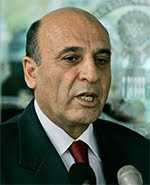
PolicyWatch #1606: Special Policy Forum Report
A General's Plan for Peace
Featuring Lt. Gen. (Ret.) Shaul Mofaz, IDF
November 20, 2009
On November 18, 2009, Lt. Gen. Shaul Mofaz addressed a special Policy Forum luncheon at The Washington Institute to discuss his new proposal for a two-state solution to the Israeli-Palestinian conflict. General Mofaz, former Israel Defense Forces chief of staff and Israeli minister of defense, as well as a former distinguished military fellow at The Washington Institute, is the current deputy leader of the Kadima Party and member of the Knesset. Following is a rapporteur's summary of his remarks.A Window of Opportunity
Achieving peace between Israelis and Palestinians comes as a very challenging task today. Despite the illusion of calm in the region, the current situation is volatile and unsustainable. The impasse in the peace process, combined with the rise of Islamic fundamentalism and the growing threat from Iran and its terrorist proxies, has heightened the prospect of a breakout of violence. With no more time to lose, Israel must begin negotiations with the Palestinians immediately to secure its future as an independent and Jewish state.
Instead of using the present stalemate as an excuse not to pursue a solution to the conflict, the current Israeli leadership must move peace forward in the window of opportunity that still exists. The abiding consensus in the international community on a two-state solution leaves open the possibility of implementing a practical and viable program for peace in the region. The following proposal proceeds from this shared vision of peace.
A Two-Stage, Two-State Solution
This plan has been framed as a forward-looking strategy that takes into account the long-term security and political needs of Israelis, as well as the basic right of the Palestinian people to rule themselves with dignity. It would start with the establishment of an independent and disarmed Palestinian state with provisional borders in the West Bank, ultimately comprising a territory almost equal to that of the West Bank with 1967 borders, as well as Gaza. In a land swap, the large settlement blocs of Maale Adumim, Gush Etzion, Ariel, and the western Shomron would remain part of Israel and form the eastern border of the state.
This program involves two stages. In the first, a Palestinian state would be created on 60 percent of the West Bank and include 99 percent of the West Bank Palestinian population. During this period, no settlements would be dismantled, and Israeli law would apply in the major settlement blocs. Negotiations over the final status issues would begin immediately, through international mediation and within a limited time frame. Initiating the second stage would be implementation of the agreement on final status issues, which first would be put to the Israeli public in a national referendum. Following the implementation, both Israeli and Palestinian sides would announce that the conflict had ended, and thereafter the international community would support efforts to achieve a regional peace beginning with Syria and Lebanon. An international mechanism would be created to address the Palestinian refugee problem.
Upon the formal end of the conflict, the newly created Palestinian state would be supported in significant measures by the international community on matters of security, the economy, and governance. The Palestinian state in the West Bank would include Gaza as soon as the elected Palestinian leadership displayed the ability to govern the two territories as one state. Concerning the makeup of the Palestinian government, Israel should be willing to negotiate with any Palestinian leadership that agrees to proceed on the basis of this plan.
This plan is unique in that it would begin implementing Israeli withdrawal from 60 percent of the West Bank before the negotiations on final status issues take place, while applying Israeli law in the settlement blocs without removing any settlement anywhere in the first phase. This plan also breaks new ground by combining the gradual, step-by-step approach to land set forth at Oslo with the immediate approach to the final status issues defined in Annapolis. The Israeli government must have a plan for Israeli-Palestinian peace, and with no other plan on the table in Israel today, this proposal stands the best chance of being accepted by both sides.
A Call for Courage
The difficulties Israel currently faces in the Middle East recall the many hardships experienced by the Jewish people throughout their long history. To overcome these present difficulties, as their forefathers did those of the past, Jews must have the courage to look not only at the gathering threats but also at the existing opportunities. In this moment, the opportunity still exists to implement a comprehensive peace in the region -- an opportunity that Israel cannot afford to overlook.
The decision to pursue peace requires courageous leadership on both the Israeli and Palestinian sides -- leaders who are not afraid to adopt new policies and move forward despite the many obstacles they face. Summoning such courage will no doubt be difficult, not least of all because Iran will attempt to disrupt any agreement through its proxies, including Hizballah, Hamas, and other fundamentalist organizations. Yet the opportunity exists, and only through courage can a comprehensive peace be achieved.
In 1947, the French author and Nobel Prize winner Andre Gide, in a statement that now pertains to the present situation, said, "It is easier to lead men to combat, stirring up their passion, than to restrain them and direct them toward the patient labors of peace." Both Israeli and Palestinian leaders must have the courage to lead their people in the more difficult of these directions. Israel, as the stronger of the two sides, has the obligation not only to defend its citizens but also to make peace.
This rapporteur's summary was prepared by Cole Bunzel.
No comments:
Post a Comment